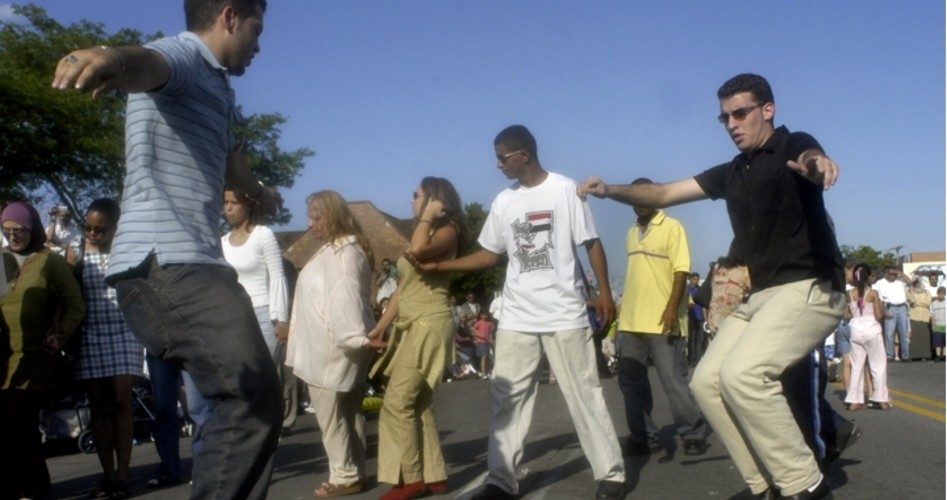
The Middle Ages had Charles the Hammer — and America has her lawyers. A large Arab festival in Dearborn, Michigan, has once again been cancelled because of high insurance costs resulting from attacks on Christians during the event. Writes the Detroit Free Press’ Niraj Warikoo:
The Arab International Festival in Dearborn has been canceled for the second year in a row, raising questions about the future of the three-day gathering in June that had become an annual tradition.
The festival was canceled last year when the city and festival organizers, the American Arab Chamber of Commerce [AACC], faced higher liability insurance costs because of growing tensions with some Christian missionaries that had resulted in arrests, accusations of harassment and lawsuits.
The festival, held over Father’s Day weekend and used as a fundraiser for the AACC, has been plagued by anti-Christian activity. The first well-publicized incident occurred in 2010 when David Wood, and ex-Muslims Negeen Mayel, Nabeel Qureshi, and Paul Rezkalla, of a Christian group called Acts 17 were arrested after sharing the Gospel. In the video found here, Qureshi is seen being taken into police custody after simply engaging Muslim youth in peaceful dialogue.
The site Bare Naked Islam, which has characterized the incident as “police enforcement of Sharia law,” added some detail, writing in 2010 that the four were arrested to “the jeers and shouts of ‘Allah Akbar’ by the Muslim crowd” and that Mayel, Wood, and Rezkalla — who were videoing what transpired — “had their cameras and other equipment illegally seized before police arrested them as well.” Acts 17 also noted the festival attendees’ attitude of Islamic triumphalism, pointing out at its blog that many Muslims took “delight” in the Christians’ arrest.
This delight, however, was short-lived. A jury acquitted the missionaries in September 2010 of a charge of breaching the peace, and in 2013 it was revealed that Dearborn had to pay Acts 17 $300,000 in a settlement also requiring that an apology to the group remain posted on the city’s website for three years.
The second high-profile incident occurred in 2012 when the group “Bible Believers” protested at the festival carrying a pig’s head and expressing sentiments highly critical of Islam. This video shows the group’s members being pelted by a Muslim crowd with rocks and other objects as the police do nothing to restore order.
Critics have said that the protesters — who also attended the event in 2011 and have carried anti-Catholic signs as well — were obviously trying to provoke a reaction. But free-speech defenders have pointed out that Christians have been subjected to repeated mockery, such as the display of pictures of a crucifix immersed in a jar of urine and of a dung-smeared Virgin Mary — and have not reacted violently. Moreover, some observers also assert that this is just part of a pattern of Islamic intolerance, a phenomenon epitomized by the worldwide Muslim protests that followed the 2005 publishing of Muhammad cartoons in the Danish newspaper Jyllands-Posten.
In point of fact, say these Islam watchers, this intolerance has led to frequent Muslim attacks on Christians in many parts of the world, attacks that are generally as unprovoked as they are unreported in the media. As The New American’s Warren Mass wrote last month citing Ron Prosor, Israel’s ambassador to the United Nations:
Among the Middle Eastern localities where Christians have suffered attacks, notes Prosor, are the Syrian cities of Aleppo and Damascus, where “Christians who refused to convert to Islam have been kidnapped, shot and beheaded by Islamist opposition fighters.” He also cites Egypt, where “mobs of Muslim Brotherhood members burn Coptic Christian churches in the same way they once obliterated Jewish synagogues.”
Another hotspot for Christians is Iraq, where, Prosor writes: “Terrorists deliberately target Christian worshipers. This past Christmas, 26 people were killed when a bomb ripped through a crowd of worshipers leaving a church in Baghdad’s southern Dora neighborhood.”
The anti-Christian turmoil in Iraq since the ouster of Saddam Hussein over 10 years ago is reflected in the figures Prosor cites. He notes that during the past 10 years, nearly two-thirds of Iraq’s 1.5 million Christians have been forced to flee their homes because of the anti-Christian violence. Many emigrated to Syria, which like Iraq under Hussein, was tolerant of Christians. However, they are “once again becoming victims of unrelenting persecution. Syria’s Christian population has dropped from 30 percent in the 1920s to less than 10 percent today.”
Furthermore, many point out that this pattern is nothing new. As Professor Thomas F. Madden, director of the Center for Medieval and Renaissance Studies at Saint Louis University, wrote in his essay “The Real History of the Crusades”:
Muslim thought divides the world into two spheres, the Abode of Islam and the Abode of War. Christianity — and for that matter any other non-Muslim religion — has no abode. Christians and Jews can be tolerated within a Muslim state under Muslim rule. But, in traditional Islam, Christian and Jewish states must be destroyed and their lands conquered. When Mohammed was waging war against Mecca in the seventh century, Christianity was the dominant religion of power and wealth. As the faith of the Roman Empire, it spanned the entire Mediterranean, including the Middle East, where it was born. The Christian world, therefore, was a prime target for the earliest caliphs, and it would remain so for Muslim leaders for the next thousand years.
With enormous energy, the warriors of Islam struck out against the Christians shortly after Mohammed’s death. They were extremely successful. Palestine, Syria, and Egypt — once the most heavily Christian areas in the world — quickly succumbed. By the eighth century, Muslim armies had conquered all of Christian North Africa and Spain. In the eleventh century, the Seljuk Turks conquered Asia Minor (modern Turkey), which had been Christian since the time of St. Paul. The old Roman Empire, known to modern historians as the Byzantine Empire, was reduced to little more than Greece.
It’s politically incorrect nowadays to trouble over Islamic inroads into Western societies, so much so that just last month U.K. politician Paul Weston was arrested for quoting a Winston Churchill passage critical of Islam. Yet can calls for “diversity” and “multiculturalism” alter age-old behavior patterns? Or is Dearborn — a city now 40-percent Muslim that critics have dubbed “Dearbornistan” — the Mideast in microcosm and a canary in the cultural coal mine?



